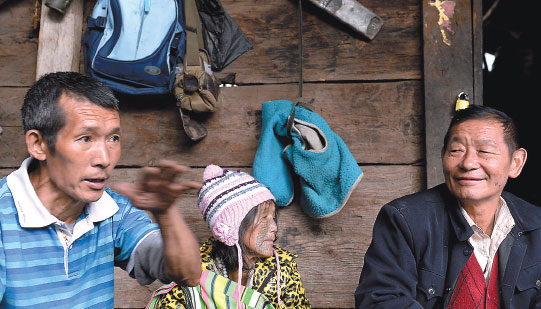

Gao Derong (right), an official of the remote Dulongjiang town in Yunnan province, visits a villager's home. The town is home to almost 70 percent of the Derung, China's smallest ethnic group. Hu Chao / Xinhua
In a remote border area of Southwest China's Yunnan province, the town of Dulongjiang is home to the largest number of the country's smallest ethnic group, the Derung. The town, surrounded by forests with the scenic Dulong River cutting through the valley, neighbors Myanmar in the west and the Tibet autonomous region in the north, and is home to 4,095 Derung, almost 70 percent of the Derung population in China.
Gao Derong, a town official who is a former teacher, is known to fellow residents as the "DerungKing" for his devotion and contributions to the town's development.
Born in 1954, two years after the minority was named by then premier Zhou Enlai, "Derung" meaning "a race under the sun", Gao has served in an official capacity for the town, county and the Nujiang Lisu autonomous prefecture.
For many years, Gao worked hard to have a road built to connect Dulongjiang with the outside world.
Until the late 1990s, paths through the forests were the only option to travel from the town to the county seat of Gongshan, and in winter they were often made impassable by heavy snow, as deep as 2meters in some cases.
Gao remembers the journey he took to reach the Normal School of Nujiang Lisu autonomous prefecture in 1972, where he spent four years studying to become a teacher. The trip from his home to the school involved three days of walking through the forest and then a ride on a truck.
In 1999, the central government invested in the construction of a 96-kilometer asphalt highway, which Gao refers to as an "imposing project". However, the town could still be cut off by heavy blizzards that occur often between April and October.
In January 2011, construction of a tunnel through the mountain was begun to solve that problem, which was finished in April. During that period, Gao helped construction teams at both ends by organizing villagers to ferry supplies to them throughout the winter. Even when blizzards occurred, the old man made sure the workers were cared for.
"When the tunnel opened, it was my happiest moment as my people will no longer be blocked in by heavy snow," he said.
The Yunnan provincial government also initiated a massive project in January 2010 to help develop Dulongjiang, focusing on infrastructure, industry and social development, and environmental protection.
Gao believes economic growth should go hand in hand with careful environmental protection. He encouraged the locals to grow plants such as tsaoko, a pungent herb used in traditional Yunnan-style cuisine. So far, the town has planted about 3,100 hectares of the plant, with each hectare returning 20,000 yuan ($3,200) in income each year.
"We also cultivate honey, Derung cattle, Derung chicken and sheep. Therefore I am quite confident that Derung will live a better life," said Gao proudly.
Gao's colleague, Peng Xuejun, said Gao doesn't stay in his office often but goes out in the field to understand the needs of the villagers and how he can support them.
Gao's wife, Ma Xiuying, 59, used to be a nurse at the Gongshan County Hospital. After she retired last year, she moved to Dulongjiang with Gao. She said her husband is seldom at home but she supports him because he is a kind man.
"I keep his bank cards, but he often 'steals' 200 to 300 yuan to give to those in difficulty or in need of money," Ma said.
Gao's devotion to his hometown is well-known.
In 2006, he was offered a promotion to become a high-ranking official in the NujiangLisuautonomous prefecture, but he instead chose to return home to Dulongjiang.
"Not all his friends and relatives agreed with him," said the couple's daughter, Gao Yingchun. "Our family also suggested he stay there, but he insisted on coming home."
It was not the first time Gao has turned down work opportunities outside his hometown.
In 1975, he was made a teacher at the Normal School of Nujiang Lisu autonomous prefecture upon his graduation. But two years later, he chose to go back to his home town to teach at Bapo Primary School.
"This is my hometown, no matter how remote, poor and undeveloped it is. I want to go back and make my own contribution," he said.
Copyright ©1999-2018
Chinanews.com. All rights reserved.
Reproduction in whole or in part without permission is prohibited.